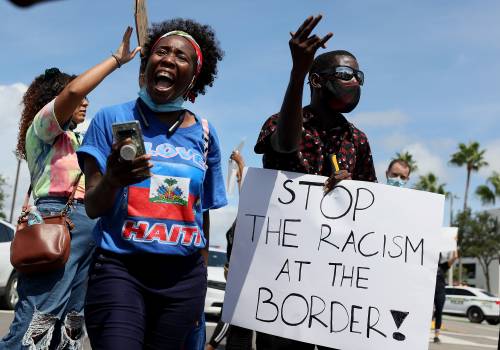
The US has made a distinction between Afghan refugees and the other vulnerable populations arriving at America’s doorstep. And it’s a false one.
Afghans fleeing Taliban rule have so far occupied a unique space in the immigration policy debate. In a climate where immigration has become a political wedge, there has been overwhelming bipartisan support for resettling at least some of them in the US: Polling has shown that 76 percent of Republicans and 90 percent of Democrats back resettlement efforts for Afghans who aided US troops. When it comes to other asylum seekers, the numbers are starkly different. For example, 64 percent of registered voters believe Biden needs to institute stricter policies at the southern border.
What makes Americans sympathetic to Afghan refugees compared to other people seeking protection? Some rightly feel a moral responsibility to protect those who were forced to leave their home due to their government’s ill-conceived and failed nation-building efforts, especially those who worked alongside American forces.
But what may also be a factor is that the Afghan war was also the kind of faraway conflict typically associated with the sort of refugees the US has historically admitted, like Somalis fleeing ongoing civil war in their home country.
Complicating this idea, however, is the fact that the kind of persecution and peril Afghans face in their home country is markedly similar to that faced by asylum seekers arriving on the US-Mexico border. Those from Central America’s Northern Triangle — Honduras, El Salvador, and Guatemala — are fleeing brutal gang violence, extortion, and government corruption, which are compounded by poverty, lack of economic opportunity, and climate-related issues. The same is true of many other groups as well, like the thousands of Haitians gathered in Del Rio, Texas.
Though the US has not fought a 20-year war in the Northern Triangle or in Haiti, it has played a direct role in creating the societal ills people are running away from, meaning the moral obligation many feel America has toward Afghans ought to extend to migrants from those countries as well.
That, of course, hasn’t been the case. Often invoking racist dog whistles, Republicans have falsely painted them as criminals who threaten public safety, carriers of disease, or economic migrants who want to skip “the line” of legal US immigration. Democrats have not necessarily been much better: The Obama administration detained migrant families on a large scale and told them “don’t come” while the Biden administration has maintained Trump-era policies, effectively blocking all asylum seekers from gaining access to protection amid the pandemic despite claiming to take a more humane approach.
Afghan refugees deserve protection. But so do the other vulnerable populations arriving at America’s doorstep. The Afghan refugee crisis has clarified this in a way other recent mass migration movements have not, and it also presents a unique opportunity for the US to recalibrate its policy about who is worthy of American protection.
Asylum seekers at the southern border are also worthy of America’s protection
Some Americans — whether they are veterans, Afghan Americans, or just witnesses to the US’s longest war — feel a personal connection to and ownership of the Afghanistan crisis that has motivated them to step up in refugees’ moment of need, even if they might not otherwise take a liberal stance on immigration issues.
Their support often extends beyond Afghans who worked alongside American troops in the US. Anecdotally, refugee advocates say they have seen people who didn’t directly aid the US war effort — including Afghan NGO workers, gender rights activists, and other at-risk minority groups — receive a bipartisan welcoming.
“There’s a debt many Americans understand and seem eager to repay,” Krish O’Mara Vignarajah, president and CEO of the Lutheran Immigration and Refugee Service, said. “They know the courage and generosity of Afghans who risked their lives to protect ours and that weighs on them. They feel a responsibility to meet our military maxim of leaving no one behind.”
On top of that, the US hurried evacuation of Afghanistan played out on worldwide broadcasts, featuring searing images of people desperately clinging to a military plane mid-takeoff and parents who lifted their babies over the Kabul airport wall and into American soldiers’ arms. That helped put a face to the crisis and galvanize American public support.
But Americans don’t feel the same ownership over the issues driving migrants to seek refuge at the southern border, as is their right under US and international law. That’s despite the fact that many of those migrants face real danger in their home countries, leaving them just as vulnerable and desperate to flee as Afghans.
Haitians are afraid to return home on account of a political crisis stemming from President Jovenel Moïse’s July assassination, resultant gang violence, and the one-two punch of a 7.2-magnitude earthquake and a tropical storm that left about 2,200 dead and thousands more injured or missing. In their desperation, some of those who have been sent back on deportation flights have even tried to force their way aboard planes heading back to the US, believing there is nothing left for them in Haiti.
And the Northern Triangle countries have some of the highest rates of poverty and violent crime in the world. Migrants are commonly robbed, kidnapped for ransom, raped, tortured, and killed. Each country has rampant government corruption and high rates of violence against women and LGBTQ individuals and remains a hot spot for international criminal gang activity, some of which has roots in the US.
The pandemic-related economic downturn and a pair of hurricanes late last year that devastated Honduras and Guatemala have only exacerbated those more longstanding problems.
“It may not be the Taliban going door to door in search of its enemies — instead, it’s narco-traffickers and gang leaders,” O’Mara Vignarajah said. “We see repression that puts a target on anyone who dares to speak out against these corrupt governments.”
It’s not just Afghans that the US has a moral obligation toward
Just as America bears responsibility for the crisis that Afghans are fleeing, it has also played a well-documented — but often-overlooked — role in creating the conditions that are driving people to make the journey to the US southern border.
The US economically knee-capped Haiti from its inception as a nation, with American banks managing and financing Haiti’s independence debt of 150 million francs to France, meant to compensate enslavers’ loss of income in exchange for France’s recognition of the former colony’s independence. The US also occupied Haiti for 19 years, beginning in 1915, in order to preserve American commercial and political influence in the country, transferring its national financial reserves to the US and rewriting its constitution to allow foreigners to own land.
The US has continued to force its interests in the country in recent years. Then-US Secretary of State Hillary Clinton intervened in Haiti’s 2010 presidential election, handpicking former President Michel Martelly, who has been criticized for mismanaging millions in international disaster relief funds in the wake of that year’s devastating earthquake.
The US has a similar history of intervention in Central America. Dating back to Theodore Roosevelt’s assertion of the US’s right to exercise “international police power” in Latin America, the US has stifled democratic movements, backed military coups, and enabled extractive economic policies in the region that have led to today’s poverty, instability, and violence.
That approach extends to more recent history, as well. For example, the Reagan administration provided military assistance to El Salvador’s authoritarian government amid a civil war that left more than 80,000 dead, most at the hands of Salvadoran military and death squads. It also supported two back-to-back military coups in Guatemala that resulted in the deaths of more than 150,000 civilians and a genocide against Indigenous people.
Later, the Bush administration pressured El Salvador, Honduras, and Guatemala — over the objections of local unionists, farmers, and informal economy workers — to enter a free trade agreement with the US that gave multinational corporations more power over domestic trade and regulations, leading to exploitative labor and wage practices.
And the Obama administration tacitly supported a military coup that ousted Honduras’s democratically elected president Manuel Zelaya, paving the way for repressive dictator Juan Orlando Hernández — who has been named as a co-conspirator in his brother’s drug crimes by US prosecutors and remains under investigation by the Department of Justice — to take power.
Nevertheless, US border policy has continued to focus on turning away people fleeing those countries, and attempts to find solutions have been piecemeal.
President Joe Biden recently restarted the Central American Minors program, which allows children from countries in the Northern Triangle to reunite with their parents living in the US. He has also allowed more than 100,000 Haitians who arrived in the US before July 29, 2021, to apply for Temporary Protected Status, which is typically offered to citizens of countries suffering from natural disasters or armed conflict. Those people are able to live and work in the US free of fear of deportation.
But he has simultaneously sought to maintain pandemic-related border restrictions established by Trump under which more than a million migrants have been expelled. Biden is also restarting Trump’s “Remain in Mexico” policy, which forced tens of thousands of migrants to wait in Mexico for their court hearings in the US. And he has resumed repatriation flights to Haiti despite conditions on the ground remaining precarious, sending people back without determining whether they are eligible for humanitarian protections in the US.
For refugee advocates, the discrepancy between the US’s response to Afghan refugees and others seeking protection is difficult to parse.
“It’s hard to reconcile how one pro-democracy activist may be admitted and another is turned away,” O’Mara Vignarajah said.
Biden can harness the energy around Afghan refugees to make the US more welcoming
Many refugee advocates see the discrepancy in some Americans’ attitudes toward Afghan refugees and asylum seekers arriving at the southern border as the result of an education gap.
O’Mara Vignarajah said that she still gets questions about why a family would risk making the treacherous, 1,000-mile journey north from the Northern Triangle with a toddler. She has to explain that they feel it’s a better alternative to the certain death they would face if they stayed.
She said that she has even had conversations with members of Congress who, while being staunch advocates for Afghan refugees, describe asylum seekers at the southern border as “illegals,” even though those people are legally entitled to claim asylum.
Those kinds of comments are rooted in a misunderstanding of the kind of circumstances that asylum seekers are fleeing and that, in effect, they are looking for the same protection as refugees. Denise Bell, a researcher for refugee and migrant rights at Amnesty International, said that she boils down the distinction to where they ask for protection: For an asylum seeker, it’s on US soil; for a refugee, it’s abroad.
Bell said that it’s not so much that Americans are inherently opposed to offering protection to people arriving on the southern border. They just don’t see them as a vulnerable population equivalent to refugees. The more Americans have experiences with refugees and asylum seekers, the more immigrant advocates can begin to close that education gap, Bell said.
On one hand, Biden has taken some steps to facilitate that contact. For instance, he’s already pledged to raise the annual cap on refugee admissions from 62,500 to 125,000 starting in October (still short of the 200,000 that advocates and progressives in Congress have called for). He is also seeking to create a private refugee sponsorship program, which would allow private organizations and groups to financially support even more refugees for resettlement in the US.
But on the other hand, the Biden administration continues to deny migrants arriving on the border the opportunity to seek humanitarian protections to which they may be entitled.
The president has clung to pandemic-related border restrictions, known as the Title 42 policy, implemented by the Trump administration last year. Since March 2020, that policy has been used to rapidly expel more than a million migrants without hearings before an immigration judge. A federal judge partially blocked the policy, effective September 30, and the Biden administration has appealed that decision.
The administration is also preparing to detain migrants at facilities in Guantanamo Bay should there be a surge of migration at the southern border. (Though administration officials told NBC they had no intention of sending Haitians arriving at the border to the facilities, the administration is seeking to hire guards who speak Creole.)
Overall, Biden could do more to change American’s perceptions — beginning by creating clarity around what constitutes a problem that merits asylum or refugee status and consistent standards for who can seek those statuses.
As things stand, it might be hard for Americans to recognize that migrants on the border are also worthy of protection for as long as Trump-era policies remain in place and Biden continues to implore them not to come.
But refugee advocates see the current crisis with Afghan refugees as an opportunity to inform a broader, more attentive audience.
“This is the moment where, in the short-term, we help all the tens of thousands of Afghan refugees who will be arriving,” she said. “But this is also the moment to create a movement of welcome. This is about everybody. Right now we start here, but it’s about everybody.”
We have a request
In moments like this — as people grapple to understand variants and vaccines, and kids head back to school — many outlets take their paywalls down. Vox’s content is always free, in part because of financial support from our readers. We’ve been covering the Covid-19 pandemic for more than a year and a half. From the beginning, our goal was to bring clarity to chaos. To empower people with the information they needed to stay safe. And we’re not stopping.
To our delight, you, our readers, helped us hit our goal of adding 2,500 financial contributions in September in just 9 days. So we’re setting a new goal: to add 4,500 contributions by the end of the month. Reader support helps keep our coverage free, and is a critical part of sustaining our resource-intensive work. Will you help us reach our goal by making a contribution to Vox with as little as $3?
Sourse: vox.com






